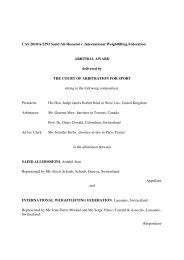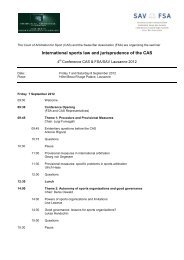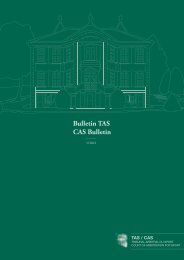CAS 2010/A/2071 - Tribunal Arbitral du Sport / TAS
CAS 2010/A/2071 - Tribunal Arbitral du Sport / TAS
CAS 2010/A/2071 - Tribunal Arbitral du Sport / TAS
Create successful ePaper yourself
Turn your PDF publications into a flip-book with our unique Google optimized e-Paper software.
) Article 17<br />
<strong>CAS</strong> <strong>2010</strong>/A/<strong>2071</strong> IFA v/ FAI, Kearns & FIFA - Page 24<br />
80. According to this provision and as an exception to Article 15 par. 1, a player must<br />
also meet one of the four territorial connections set out in Article 17 if he acquires<br />
a new nationality.<br />
81. As accepted at the hearing by the IFA, the exception to the general principle<br />
provided under Article 17 is not engaged in the present matter: Mr Kearns was<br />
born an Irish citizen. His claimed eligibility to play for the representative team of<br />
the FAI is therefore not the result of the acquisition of a new nationality. There is<br />
thus no reason to give any further consideration to this provision. Save to observe<br />
that its origins lie in the FIFA Circular Letter No. 901, dated 19 March 2004<br />
which is exclusively related to the change of nationality. Therefore, contrary to<br />
its submissions, IFA cannot find any assistance in this circular to support its<br />
argument that players with <strong>du</strong>al citizenship fall under Article 16 and must have a<br />
territorial connection with the association of the concerned representative team.<br />
c) Article 18<br />
82. By way of exception to the general principle set out in Article 15 par. 2, Article 18<br />
authorizes players to operate a switch from one association for which they are<br />
eligible under Articles 15 to 17 to another association. It provides that a player<br />
with <strong>du</strong>al (or more) nationality (“If a Player has more than one nationality” –<br />
Article 15 par. 1) or with “shared nationality” (“or if a Player is eligible to play<br />
for several representative teams <strong>du</strong>e to nationality” – Article 16), or players who<br />
“acquires a new nationality” (Article 17), may change association on only one<br />
occasion subject to the three following requirements:<br />
• “He has not played a match (either in full or in part) in an official<br />
competition at “A” international level for his current Association”.<br />
• “… at the time of his first full or partial appearance in an international<br />
match in an official competition for his current Association, he already had<br />
the nationality of the representative team for which he wishes to play”.<br />
• “He is not permitted to play for his new Association in any competition in<br />
which he has already played for his previous Association”.<br />
83. It is undisputed that Mr Kearns fulfils the above prerequisites and must therefore<br />
be recognized to enjoy the right to a change of association, from the IFA to the<br />
FAI.<br />
II. Are the IFA and the FAI bound by a contract, the terms of which supersede<br />
any applicable provision of the 2009 Application Regulations?<br />
84. The 2009 Statutes and the 2009 Application Regulations were adopted at the<br />
Congress in Nassau on 3 June 2009 and came into force on 2 August 2009. The<br />
Congress is the supreme and legislative body (Article 21 of the 2009 Statues)





